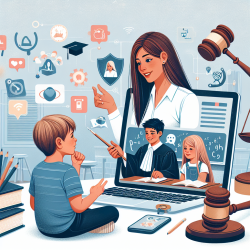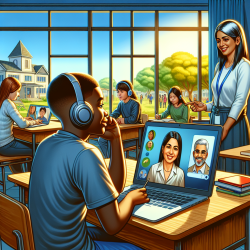Unlocking Success: The Power of Online Therapy in Schools
In the ever-evolving landscape of educational and health services, online therapy has emerged as a beacon of innovation, especially in school settings. The use of telepractice in speech therapy is not only transforming how services are delivered but also ensuring that no child is left behind. For government health regulators, understanding and embracing this shift is crucial to creating effective tools that support both educators and students.
The Need for Innovative Solutions
Schools across the nation face a common challenge: ensuring adequate speech therapy staffing. Traditional models often struggle to meet the demand, especially in rural or underserved areas. Here, telepractice offers a revolutionary solution. By leveraging technology, schools can access a wider pool of qualified therapists, ensuring that every child receives the attention they need.
Data-Driven Decisions: The Backbone of Effective Implementation
At TinyEYE, we believe in the power of data-driven decisions. Our approach is rooted in evidence-based practices that not only enhance the delivery of therapy but also track progress with precision. By collecting and analyzing data, we provide insights that are crucial for tailoring interventions to each child's unique needs.
Creating Tools for Success
For government health regulators, the focus should be on creating tools that facilitate the integration of telepractice into school systems. This involves:
- Policy Development: Establishing guidelines that ensure quality and consistency in online therapy services.
- Training Programs: Providing educators and therapists with the skills needed to effectively use telepractice tools.
- Technology Infrastructure: Investing in reliable internet and devices to support seamless therapy sessions.
By focusing on these areas, regulators can inspire confidence in schools and parents, ensuring that online therapy is not just a temporary fix, but a sustainable model for the future.
Inspiring Change Through Evidence
The impact of telepractice is evident in the data. Studies have shown that online therapy can be as effective as in-person sessions, with the added benefits of flexibility and accessibility. For instance, a recent study highlighted that students receiving online speech therapy showed significant improvements in communication skills, comparable to those in traditional settings.
Such evidence is crucial for inspiring change. By showcasing the success stories and positive outcomes associated with telepractice, we can encourage more schools and regulators to embrace this innovative approach.
Conclusion
As we look to the future, the integration of online therapy in schools represents a paradigm shift in how we approach educational and health services. For government health regulators, the challenge and opportunity lie in creating tools that not only facilitate this transition but also enhance the quality of care provided to students.
At TinyEYE, we are committed to supporting this journey by providing data-driven, evidence-based solutions that empower schools and inspire confidence in the efficacy of telepractice. Together, we can unlock the potential of every child, ensuring that they have the tools they need to succeed.










